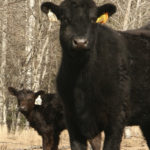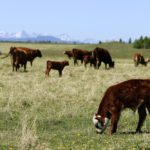
Does antibiotic resistance move through the environment?
Research on the Record with Reynold Bergen
Recent columns have talked about antibiotic use in Canadian cow-calf and feedlot operations. Contrary to common misperceptions, antibiotic-resistant bacteria are very unlikely to transfer from cattle to beef, evade food safety interventions in the processing plant, survive cooking, and cause an antibiotic-resistant infection in a person. But can antibiotic-resistant bacteria be transmitted from cattle, through […] Read more

Your burgers are still done at 71
Research on the Record with Reynold Bergen
Maintaining consumer confidence is crucial to our industry. Consumer confidence in the safety of Canadian beef was briefly shaken by the 2012 XL Foods E. coli outbreak that infected at least 18 people and resulted in the recall of 1,800 tonnes of beef, a $4 million legal settlement and the sale of the packing plant […] Read more

Antibiotic use in Canadian feedlots
Research on the Record with Reynold Bergen
September’s column summarized a Beef Cluster project that evaluated antibiotic use in western Canadian cow-calf operations. Nearly all cow-calf farms used antibiotics, but very few animals were treated, and most of the antibiotics used were not related to the antibiotics most commonly used in humans. But when it comes to antibiotic use in the beef […] Read more

Developing faster, cheaper diagnostic tests for calves
Research on the Record with Reynold Bergen
Last month’s column discussed how antibiotics are used in western Canadian cow-calf operations. Respiratory diseases are a common reason for antibiotic treatment in cows, bulls, and calves and diarrhea is a common reason for antibiotic treatment in young calves. Because both respiratory and intestinal infections can involve many different microbes, having a better understanding of […] Read more

Antibiotic use on Canadian cow-calf operations
Research on the Record with Reynold Bergen
Antibiotic use records are important for producers who want to track the effectiveness of the antibiotics they use. Industry groups need antibiotic use data to refute misleading claims about our production practices. Even restaurant chains and meat companies marketing “antibiotic-free” beef need records to keep treated animals out of their “never-ever” supply stream. When it […] Read more

What we learned from the Canada Beef Quality Audit
Research on the Record with Reynold Bergen
Canada’s fourth Beef Quality Audit was completed in March 2018, following previous audits in 1995, 1998 and 2010-11. The carcass audit measured the incidence and economic costs of avoidable defects in Canadian slaughter cattle and beef and identified opportunities to avoid these losses. What they did: Mark Klassen, Joyce van Donkersgoed and a team of […] Read more

This column is brought to you by your national check-off
Research on the Record with Reynold Bergen
The third annual Canadian Beef Industry Conference (CBIC) takes place in London, Ont., on August 14-16. The CBIC is co-hosted by the Beef Cattle Research Council (BCRC), Canada Beef, Canadian Beef Breeds Council, and the Canadian Cattlemen’s Association (CCA). The CBIC’s Bov-Innovation session is a popular, interactive, fast-paced workshop full of tips, ideas, and concepts […] Read more

Have you rotated your breeds lately?
Research on the Record with Reynold Bergen
Before becoming a politician and long before becoming a noted western Canadian historian, Grant McEwan was an animal science professor at the University of Saskatchewan. In 1938, he and A.M. Shaw published “An Experiment in Beef Production in Western Canada” (Scientific Agriculture XIX:177-198), summarizing one of Canada’s first crossbreeding projects. Straightbred two-year-old Angus, Shorthorn, Galloway […] Read more

A story to make your skin crawl
Research on the Record with Reynold Bergen
Cattle won’t be the only creatures enjoying fresh pasture this spring; so will the Rocky Mountain wood tick and the American dog tick, which can transmit anaplasmosis and other bloodborne diseases. Anaplasmosis was removed from the federally reportable disease list in 2014, so the government is no longer responsible for dealing with anaplasmosis outbreaks or […] Read more

How castration method and age affect pain in young calves
Research on the Record with Reynold Bergen
Canada’s Code of Practice for the Care and Handling of Beef Cattle requires that castration be performed by an experienced person who uses proper, clean, well-maintained equipment and accepted techniques. A producer is expected to seek guidance from their veterinarian on the optimum method and timing of castration, as well as the availability and advisability […] Read more



